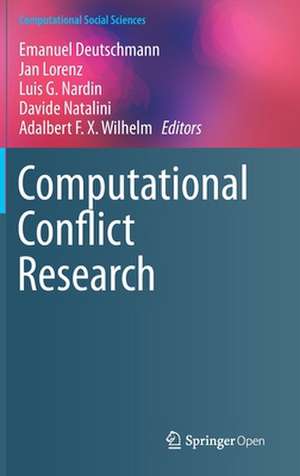Computational Conflict Research: Computational Social Sciences
Editat de Emanuel Deutschmann, Jan Lorenz, Luis G. Nardin, Davide Natalini, Adalbert F. X. Wilhelmen Limba Engleză Hardback – 15 noi 2019
Empirical cases range from migration policy framing in North America and street protests in Iran to violence against civilians in Congo and food riots world-wide.
Supplementary materials in the book include a comprehensive list of the datasets on conflict and dissent, as well as resources to online repositories where the annotated code and data of individual chapters can be found and where (agent-based) models can be re-produced and altered. These materials are a valuable resource for those wishing to retrace and learn from the analyses described in this volume and adapt and apply them to their own research interests.
By bringing together novel research through an international team of scholars from a range of disciplines, Computational Conflict Research pioneers and maps this emerging field. The book will appeal to students, scholars, and anyone interested in the prospects of using computational social sciences to advance our understanding of conflict dynamics.
| Toate formatele și edițiile | Preț | Express |
|---|---|---|
| Paperback (1) | 366.16 lei 38-44 zile | |
| Springer International Publishing – 11 sep 2020 | 366.16 lei 38-44 zile | |
| Hardback (1) | 428.07 lei 6-8 săpt. | |
| Springer International Publishing – 15 noi 2019 | 428.07 lei 6-8 săpt. |
Din seria Computational Social Sciences
- 15%
 Preț: 649.39 lei
Preț: 649.39 lei - 18%
 Preț: 964.54 lei
Preț: 964.54 lei - 15%
 Preț: 643.34 lei
Preț: 643.34 lei - 15%
 Preț: 640.88 lei
Preț: 640.88 lei - 20%
 Preț: 338.16 lei
Preț: 338.16 lei -
 Preț: 390.63 lei
Preț: 390.63 lei -
 Preț: 395.47 lei
Preț: 395.47 lei - 20%
 Preț: 662.11 lei
Preț: 662.11 lei - 20%
 Preț: 618.05 lei
Preț: 618.05 lei - 20%
 Preț: 760.97 lei
Preț: 760.97 lei - 20%
 Preț: 628.79 lei
Preț: 628.79 lei - 20%
 Preț: 649.93 lei
Preț: 649.93 lei - 20%
 Preț: 761.44 lei
Preț: 761.44 lei - 15%
 Preț: 643.48 lei
Preț: 643.48 lei - 18%
 Preț: 1117.34 lei
Preț: 1117.34 lei - 20%
 Preț: 1169.47 lei
Preț: 1169.47 lei -
 Preț: 432.12 lei
Preț: 432.12 lei -
 Preț: 393.13 lei
Preț: 393.13 lei - 18%
 Preț: 887.38 lei
Preț: 887.38 lei -
 Preț: 383.93 lei
Preț: 383.93 lei - 20%
 Preț: 241.67 lei
Preț: 241.67 lei - 15%
 Preț: 523.07 lei
Preț: 523.07 lei - 15%
 Preț: 693.06 lei
Preț: 693.06 lei -
 Preț: 487.75 lei
Preț: 487.75 lei - 20%
 Preț: 1166.19 lei
Preț: 1166.19 lei - 15%
 Preț: 696.02 lei
Preț: 696.02 lei - 20%
 Preț: 1156.62 lei
Preț: 1156.62 lei - 25%
 Preț: 470.31 lei
Preț: 470.31 lei
Preț: 428.07 lei
Nou
Puncte Express: 642
Preț estimativ în valută:
81.91€ • 85.75$ • 67.78£
81.91€ • 85.75$ • 67.78£
Carte tipărită la comandă
Livrare economică 05-19 aprilie
Preluare comenzi: 021 569.72.76
Specificații
ISBN-13: 9783030293321
ISBN-10: 3030293327
Pagini: 264
Ilustrații: XVIII, 264 p. 54 illus., 33 illus. in color.
Dimensiuni: 155 x 235 mm
Greutate: 0.58 kg
Ediția:1st ed. 2020
Editura: Springer International Publishing
Colecția Springer
Seria Computational Social Sciences
Locul publicării:Cham, Switzerland
ISBN-10: 3030293327
Pagini: 264
Ilustrații: XVIII, 264 p. 54 illus., 33 illus. in color.
Dimensiuni: 155 x 235 mm
Greutate: 0.58 kg
Ediția:1st ed. 2020
Editura: Springer International Publishing
Colecția Springer
Seria Computational Social Sciences
Locul publicării:Cham, Switzerland
Cuprins
Chapter1: Advancing Conflict Research through Computational Approaches.- PARTI: Data and Methods in Computational Conflict Research.- Chapter2: Advances in Data on Conflict and Dissent.- Chapter3: Text as Data for Conflict Research: A Literature Survey.- Chapter4: Interdependencies in Conflict Dynamics: Analyzing Endogenous Patterns in Conflict Event Data Using Relational Event Models.- PARTII: Computational Research on Non-violent Conflict.- Chapter5: Migration Policy Framing in Political Discourse: Evidence from Canada and the US.- Chapter6: The Role of Network Structure and Initial Group Norm Distribution in Norm Conflict.- Chapter7: On the Fate of Protests: Dynamics of Activation and Topic Selection Online and In the Streets.- PartIII: Computational Research on Violent Conflict.- Chapter8: Do Non-State Armed Groups influence each other in attack timing and frequency? Generating, analyzing, and comparing empirical data and simulation.- Chapter9: On the Beaten Path: Violence against Civilians and Simulated Conflict along Road Networks.- Chapter10: Analysis of Conflict Diffusion over Continuous Space,- Chapter11: Rebel Group Protection Rackets: Simulating the Effects of Economic Support on Civil War Violence
Textul de pe ultima copertă
This open access book brings together a set of original studies that use cutting-edge computational methods to investigate conflict at various geographic scales and degrees of intensity and violence. Methodologically, this book covers a variety of computational approaches from text mining and machine learning to agent-based modelling and social network analysis.
Empirical cases range from migration policy framing in North America and street protests in Iran to violence against civilians in Congo and food riots world-wide.
Supplementary materials in the book include a comprehensive list of the datasets on conflict and dissent, as well as resources to online repositories where the annotated code and data of individual chapters can be found and where (agent-based) models can be re-produced and altered. These materials are a valuable resource for those wishing to retrace and learn from the analyses described in this volume and adapt and apply them to their own research interests.
By bringing together novel research through an international team of scholars from a range of disciplines, Computational Conflict Research pioneers and maps this emerging field. The book will appeal to students, scholars, and anyone interested in the prospects of using computational social sciences to advance our understanding of conflict dynamics.
Caracteristici
Open access book presenting a broad range of cutting-edge computational methods applied to research in conflict dynamics Contains applications to salient conflicts from several world regions at various scales and degrees of violence Provides an insightful introduction to the field through sections on data and methods
